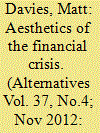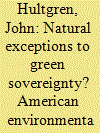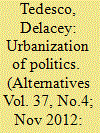| Srl | Item |
| 1 |
ID:
117870


|
|
|
|
|
| Publication |
2012.
|
| Summary/Abstract |
The ways that financialization has contributed to the technocratic and antipolitical management of economies have become ever more evident in the wake of the financial crisis that commenced in the autumn of 2007. This bracketing and suspension of politics occurs in various ways but significantly, it does so through the obscuring of work as a moment of economic life. If economics has been complicit in this antipolitics, can an aesthetic approach to financialization shed light on how work is rendered invisible? This article analyzes four short film clips all distributed through YouTube to show not only how their visual and narrative elements organize subjectivities for an antipolitics of finance but also to find in the popular aesthetic a different "distribution of the sensible" that permits moments of suspension or rupture that can politicize financialized subjectivity and begin to recover a politics of work.
|
|
|
|
|
|
|
|
|
|
|
|
|
|
|
|
| 2 |
ID:
117869


|
|
|
|
|
| Publication |
2012.
|
| Summary/Abstract |
Rather than making any general claims supporting or opposing the "greening" of sovereignty, this article examines the variable discourses through which the ethos of ecosovereignty is reconfigured. The questions that drive this inquiry are (1) through what discursive pathways do conceptions of nature, political community, and governance intersect to constitute exclusionary ethoses of ecosovereignty? and (2) how might alternative articulations challenge such exclusions? These questions are pursued by examining the contemporary American "environmental restrictionist" (immigration-reduction environmentalist) movement, and critical responses to the movement. It traces how nature, political community, and governance are conceptualized and related to one another in efforts to bolster alternative configurations of ecosovereignty. By gaining insight into the various discourses through which iterations of ecosovereignty emerge, scholars and practitioners might better respond to the multiplicity of ways that nature becomes enmeshed in exclusionary social forms.
|
|
|
|
|
|
|
|
|
|
|
|
|
|
|
|
| 3 |
ID:
117868


|
|
|
|
|
| Publication |
2012.
|
| Summary/Abstract |
Marx and Engels warned that class struggle would result "either in a revolutionary reconstitution of society at large, or in the common ruin of the contending classes." This essay argues that through the effect of neoliberal networked economy, we have had both a "revolutionary reconstitution of society" and the "common ruin" of both bourgeois and proletarian classes. Their "common ruin" is expressed through their lack of viability as the basis for their respective democratic projects-liberalism and socialism. The revolution in information technologies and the rise of the neoliberal network society has transformed the nature of political power that had been founded upon traditional industrial forms of production and social-political organization. The essay develops a theory of technological change and a subsequent transformation in our relationship with time. By emphasizing the dialectic of technological-temporal change in the nature and quality of political power, we see that the very basis of both power and politics has become transformed in ways that negatively affect the potential of democratic forms of power, liberal, or socialist. The essay ends with a call for a new political approach to time, a "temporal sovereignty" to revive and renew the basis of democracy within a networked society.
|
|
|
|
|
|
|
|
|
|
|
|
|
|
|
|
| 4 |
ID:
117871


|
|
|
|
|
| Publication |
2012.
|
| Summary/Abstract |
If we live, as we are told, in an urbanizing world, then the problem of contemporary political analysis must be tackled by rethinking politics as practices of urbanizing spaces and subjectivities. This article questions whether relational ontologies of urban spatiotemporality and spatialized inter-subjectivity are sufficient as bases for analyses of the contemporary forms of politics enacted within practices and processes of urbanization. I argue that they are not, and suggest instead that urbanization puts into play multiple, overlapping aporetic boundaries between nature and culture, rural and urban, nature and urban, and ultimately between politics and its limits.
|
|
|
|
|
|
|
|
|
|
|
|
|
|
|
|